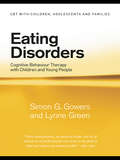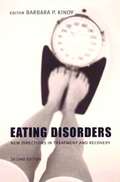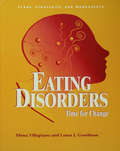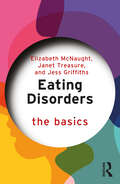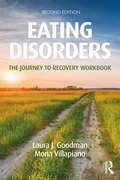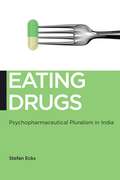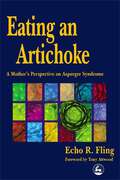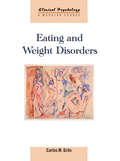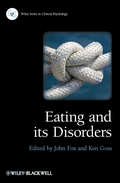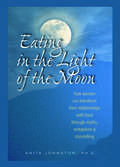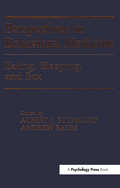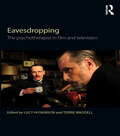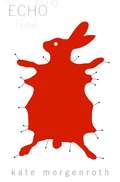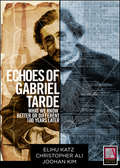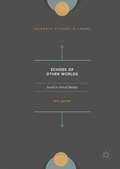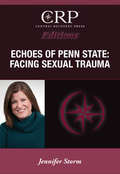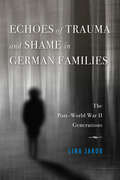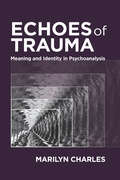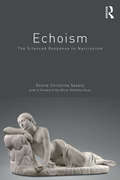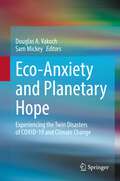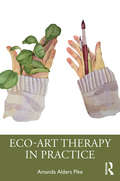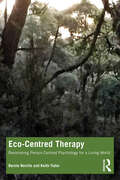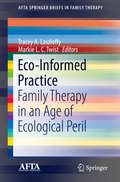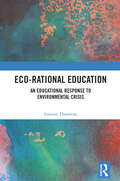- Table View
- List View
Eating Disorders: Cognitive Behaviour Therapy with Children and Young People (CBT with Children, Adolescents and Families)
by Lynne Green Simon G. GowersEating disorders comprise a range of physical, psychological and behavioural features that often have an impact on social functioning and can invade most areas of the sufferer’s life. Although eating and weight disorders are common in children and adolescents, there is a scarcity of practical guidance on treatment methods for eating disorders in young people. In this book, Simon Gowers and Lynne Green bring together up-to-date research, clinical examples and useful tips to guide practitioners in working with young people, as well as helping families of children and adolescents to deal with their difficulties. Eating Disorders provides the clinician with an introduction about how CBT can be used to challenge beliefs about control, restraint, weight and shape, allowing young people to manage their eating disorder. Chapters cover: preparing for therapy a CBT treatment programme applications and challenges. This practical text will be essential reading for mental health professionals, paediatric teams and those in primary care working with children and adolescents with eating disorders. It will benefit those working with both sufferers themselves and families who have difficulty understanding the disorder.
Eating Disorders: New Directions in Treatment and Recovery (Issues Ser. #Vol. 127)
by Ed. Kinoy Barbara P.Fully revised to reflect changes in the field, this collection of essays by psychotherapists who specialize in the treatment of anorexia nervosa and bulimia explains in accessible and humane terms how the treatment process works and demonstrates strategies that lead to recovery. The book details the interaction between practitioner and patient, practitioner and practitioner, and family members. The collection, which draws upon the knowledge and experience of clinicians who have practiced at the Wilkins Center for Eating Disorders, also points up the advantages of a collaborative team, for both the patient and professionals.
Eating Disorders: New Directions in Treatment and Recovery, Second Edition
by Barbara P. KinoyFully revised to reflect changes in the field, this collection of essays by psychotherapists details the interaction between practitioner and patient, practitioner and practitioner, and family members.
Eating Disorders: Plans, Strategies, and Worksheets
by Laura J. Goodman Mona VillapianoThis collection for therapists and clients presents practical, how-to information, for the treatment of eating disorders. The authors have kept the needs of the therapist in mind by considering managed care as well as specific therapeutic issues. This resource will maximize the efficient use of time and resources for the therapist and increase the efficacy of work with clients with eating disorders. Clients will find the tools to be helpful resources and a critical extension of individual therapy.
Eating Disorders: The Basics (The Basics)
by Janet Treasure Elizabeth McNaught Jess GriffithsEating disorders affect people from all backgrounds, and often go untreated for years. This book offers an accessible and evidence-based overview. Chapters explore some of the most common risk factors that can predispose, precipitate, and perpetuate an eating disorder, as well as understanding the typical way they are diagnosed and treated. Interwoven with real life stories, and written by authors with diverse experiences, they provide the tools necessary to understand eating disorders better. Topics include anorexia nervosa, bulimia nervosa, binge eating disorder, treatment, diversity in eating disorders, and how to support someone living through these conditions. A glossary of useful key terms is included, along with chapter summaries and up-to-date research. This book is essential for all health care professionals and students, as well as those suffering with an eating disorder and their families and friends.
Eating Disorders: The Journey to Recovery Workbook
by Laura J. Goodman Mona VillapianoThe widely updated second edition of Eating Disorders: Journey to Recovery Workbook helps those struggling with eating disorders in their recovery, guiding the reader through a greater consideration of body image, compulsive exercising, and personal and societal relationships based on Prochaska’s Stages of Change Theory. The workbook explores complicated issues having a direct effect on the eating disorder, including trauma, depression, gender identity, abuse, and the media. Updated to include the acknowledgement of binge-eating disorder, selective eating, and avoidant restrictive food intake disorder (ARFID), this second edition encourages self-paced learning and practice adjunct to one-on-one and group therapy from two seasoned clinicians in the treatment of eating disorders.
Eating Drugs: Psychopharmaceutical Pluralism in India (Biopolitics #20)
by Stefan EcksA Hindu monk in Calcutta refuses to take his psychotropic medications. His psychiatrist explains that just as his body needs food, the drugs are nutrition for his starved mind. Does it matter how—or whether—patients understand their prescribed drugs? Millions of people in India are routinely prescribed mood medications. Pharmaceutical companies give doctors strong incentives to write as many prescriptions as possible, with as little awkward questioning from patients as possible. Without a sustained public debate on psychopharmaceuticals in India, patients remain puzzled by the notion that drugs can cure disturbances of the mind. While biomedical psychopharmaceuticals are perceived with great suspicion, many non-biomedical treatments are embraced. Stefan Ecks illuminates how biomedical, Ayurvedic, and homeopathic treatments are used in India, and argues that pharmaceutical pluralism changes popular ideas of what drugs do. Based on several years of research on pharmaceutical markets, Ecks shows how doctors employ a wide range of strategies to make patients take the remedies prescribed. Yet while metaphors such as "mind food" may succeed in getting patients to accept the prescriptions, they also obscure a critical awareness of drug effects.This rare ethnography of pharmaceuticals will be of key interest to those in the anthropology and sociology of medicine, pharmacology, mental health, bioethics, global health, and South Asian studies.
Eating an Artichoke: A Mother's Perspective on Asperger Syndrome
by Tony Attwood Echo R FlingDuring a routine parent-teacher conference in November 1991, Echo Fling was told by her son's teacher that his behaviour in class was `not normal'. After two years at the pre-school, five-year-old Jimmy had failed to make any friends, had recently started to act aggressively towards his classmates, and was beginning to react violently to any changes in his routine. Echo was not taken completely by surprise: she had suspected for some time that her son was different from other children. Over the next five years, she and her husband accompanied Jimmy to doctors, medical specialists, learning consultants and psychologists. Finally, at the age of ten, Jimmy was diagnosed with Asperger Syndrome. This is the book that Echo Fling needed when she first set out to have Jimmy diagnosed, and it will enable parents and teachers to understand and help other children with Asperger Syndrome.
Eating and Weight Disorders: A Modular Course: Eating And Weight Disorders (Clinical Psychology: A Modular Course)
by Carlos M. GriloEating disorders refer to a range of problems characterized by abnormal eating behaviours and beliefs about eating, weight, and shape. Eating disorders, which are classified as psychiatric problems, and obesity, which is classified as a general medical condition, reflect a diverse and perplexing array of biological, social, and psychological phenomena. Beginning with a comprehensive overview of eating and weight disorders, this volume also covers: anorexia nervosa bulimia nervosa atypical eating disorders and binge eating disorders obesity. Including the most up-to-date research, Carlos Grilo provides a balanced and authoritative overview of current thinking in the fields of eating disorders and obesity with broad yet in-depth coverage of the areas. This highly readable book is an indispensable resource to students and professionals in clinical psychology, health psychology, and psychiatry.
Eating and its Disorders
by John R. Fox Ken GossEating and its Disorders features contributions by international experts in the field of eating disorders which represent an overview of the most current knowledge relating to the assessment, treatment, and future research directions of the study of eating-related disorders. Presents the newest models and theories for use in the treatment of patients with eating disorders Written specifically to fulfill the needs of clinical psychologists and therapists Includes coverage of important service related issues for working with people with eating disorders Features chapters from a global group of authors which highlight differing methods and perspectives that can be incorporated into clinical practice
Eating in the Light of the Moon
by Anita JohnstonBy weaving practical insights and exercises through a rich tapestry of multicultural myths, ancient legends, and folktales, Anita Johnston helps the millions of women preoccupied with their weight discover and address the issues behind their negative attitudes toward food.
Eating, Sleeping, and Sex: Perspectives in Behavioral Medicine (Perspectives on Behavioral Medicine Series)
by Albert J. Stunkard; Andrew BaumThe lack of balance and the failure of regulation in life has traditionally been recognized in such extreme symbolic acts as overconscientiousness or a criminal lack of conscience. This volume shows how the neurotic process affects biologic functions, distorting natural functioning. Three distinct functions and their respective extremes are discussed: eating (obesity, bulimia nervosa), sleeping (insomnia, excessive somnolence), and sex (hypersexuality including child molestation, hyposexuality including inhibited sexual desires).
Eavesdropping: The psychotherapist in film and television
by Lucy Huskinson Terrie WaddellWhat can depictions of psychotherapy on screen teach us about ourselves? In Eavesdropping, a selection of contributions from internationally-based film consultants, practicing psychotherapists and interdisciplinary scholars investigate the curious dynamics that occur when films and television programmes attempt to portray the psychotherapist, and the complexities of psychotherapy, for popular audiences. The book evaluates the potential mismatch between the onscreen psychotherapist, whose raison d’être is to entertain and engage global audiences, and the professional, real-life counterpart, who becomes intimately involved with the dramas of their patients. While several contributors conclude that actual psychotherapy, and the way psychotherapists and their clients grapple with notions of fantasy and reality, would make a rather poor show, Eavesdropping demonstrates the importance of psychotherapy and psychotherapists on-screen in assisting us to wrestle with the discomfort – and humour - of our lives. Offering a unique insight into perceptions of psychotherapy, Eavesdropping will be essential and insightful reading for analytical psychologists, psychoanalysts, academics and students of depth psychology, film and television studies, media studies and literature, as well as filmmakers.
Echo
by Kate MorgenrothHow can I know what's going to happen? But somehow he did know. The feeling was like déjà vu but stronger...and scarier. It told him that without a doubt something was going to happen. And it was going to be bad. *** In the year since Justin's younger brother, Mark, died in a horrific accident, Justin's life has unraveled. Justin used to be one of the school's star athletes, but now he's not even on any of the teams. He used to be part of the popular crowd, but now everyone at school treats him like he's a monster. He used to date one of the prettiest girls at school, but now she will barely speak to him. Then on the anniversary of his brother's death he gets into a fight with his former best friend, and things spiral out of control -- with terrible consequences. But that's not the worst. Now Justin is hearing a voice that's making him relive the day of the accident over and over again. In this dark thriller, Edgar Award nominee Kate Morgenroth explores the thin line between reality and illusion inside a troubled young mind.
Echoes of Gabriel Tarde: What We Know Better or Different 100 Years Later
by Larry Gross Arlene Luck Christopher Ali Elihu Katz Joohan KimOriginally published in 1898, Gabriel Tarde's essay "Opinion and Conversation" can be read as a series of propositions about the interaction of press, conversation, opinion and action, anticipating today's "deliberative democracy." Exploring these themes in a hyper-text "dialogue" with Tarde, Elihu Katz, Christopher Ali, and Joohan Kim ask what we know better or different 100 years later in this book. The aim is not only to reawaken attention to Tarde's text, but to assess the progress of communications research in its light. The e-book's format makes it possible to access the essay as a series of propositions, foreshadowing contemporary concerns with issues such as agenda setting, public opinion formation, the diffusion of innovation, the two-step flow of communication, the role of the press in nation-building, new media technologies, the normative role of media in a democracy, media events, and the like. The e-book includes an analytic Introduction, a biographical postscript and the first full English translation of Tarde's essay. Long overlooked, "Opinion and Conversation" deserves to be canonized as foundational for theories that link mass and interpersonal communication, especially in the age of social media. Authors are Elihu Katz, Distinguished Trustee Professor of the Annenberg School for Communication at the University of Pennsylvania, Christopher Ali, Assistant Professor of Communication at the University of Virginia, and Joohan Kim, Professor of Communication at Yonsei University in South Korea. Louise Salmon of the Sorbonne (Paris 1) contributed the biographical note.
Echoes of Other Worlds: Sound in Virtual Reality
by Tom A. GarnerThis book explores the nature and importance of sound in virtual reality (VR). Approaching the subject from a holistic perspective, the book delivers an emergent framework of VR sound. This framework brings together numerous elements that collectively determine the nature of sound in VR; from various aspects of VR technology, to the physiological and psychological complexities of the user, to the wider technological, historical and sociocultural issues. Garner asks, amongst other things: what is the meaning of sound? How have fictional visions of VR shaped our expectations for present technology? How can VR sound hope to evoke the desired responses for such an infinitely heterogeneous user base? This book if for those with an interest in sound and VR, who wish to learn more about the great complexities of the subject and discover the contemporary issues from which future VR will surely advance.
Echoes of Penn State
by Jennifer StormAward-winning author and nationally recognized victim's rights advocate, Jennifer Storm, has written a powerful response to the Jerry Sandusky adolescent sex abuse case. Mixing elements of her own story of victimization with a stunning critique of the handling of the case, she has created a document that is required reading for anyone trying to find answers in this unfolding tragedy.
Echoes of Trauma and Shame in German Families: The Post–World War II Generations
by Lina JakobHow is it possible for people who were born in a time of relative peace and prosperity to suddenly discover war as a determining influence on their lives?For decades to speak openly of German suffering during World War II—to claim victimhood in a country that had victimized millions—was unthinkable. But in the past few years, growing numbers of Germans in their 40s and 50s calling themselves Kriegsenkel, or Grandchildren of the War, have begun to explore the fundamental impact of the war on their present lives and mental health. Their parents and grandparents experienced bombardment, death, forced displacement, and the shame of the Nazi war crimes. The Kriegsenkel feel their own psychological struggles—from depression, anxiety disorders, and burnout to broken marriages and career problems—are the direct consequences of unresolved war experiences passed down through their families.Drawing on interviews, participant observation, and a broad range of scholarship, Lina Jakob considers how the Kriegsenkel movement emerged at the nexus between public and familial silences about World War II, and critically discusses how this new collective identity is constructed and addressed within the framework of psychology and Western therapeutic culture.
Echoes of Trauma: Meaning and Identity in Psychoanalysis
by Marilyn CharlesIntricately weaves psychoanalytic and developmental theory to explain how we become who we are, and how we might grow beyond the places we get stuck. In recent decades psychological research and practice has focused heavily on cognitive domains, with far less attention paid to the nonverbal systems through which people register essential meanings. This has led many clinicians to seek disembodied and often mechanistic solutions to clients&’ problems. But these approaches fail to recognize hidden sources of trauma, which can be difficult to access through conscious reflection. As the source of a trauma recedes further into the past and remains unexplored and unmourned, the effect can become a lingering adversity that masquerades as destiny—and this worldview can even be passed along through subsequent generations. In this volume, Marilyn Charles argues for a more embodied, less mechanistic view of human development. To understand a client&’s problem at a particular moment in time, we must understand the history that has given rise to it, some of which the client may be able to tell us directly, but some that we must intuit from signs and symptoms because not all history can be recalled consciously. After drawing on psychoanalytic and developmental theory to ground her model, Charles uses clinical vignettes and comparisons with her own life to illustrate how we might facilitate our clients&’ development. Development is never final. It is an ongoing, lifelong process that can get off-track. Using the theory and techniques in this book, therapists can help clients find and integrate the missing pieces of their life story.
Echoism: The Silenced Response to Narcissism
by Donna Christina SaveryThis book introduces the importance of echoism as a clinical entity and a theoretical concept. In Ovid's version of the myth of Echo and Narcissus, the character Echo receives equal attention to her counterpart, Narcissus, yet she has been completely marginalised in the pervasive literatures on narcissism. The author draws upon her work with patients who have experienced relationships with narcissistic partners or parents, and have developed a particular configuration of object relations and ways of relating for which she uses the term echoism. She uses psychoanalytic theory and existential philosophical ideas to underpin her formulations and inform her clinical thinking. Donnna Savery explores the question 'Am I an Echoist?' and introduces the concept of Echoism in the following YouTube video: https://www.youtube.com/watch?v=EEyjolXL7lA
Eco-Anxiety and Planetary Hope: Experiencing the Twin Disasters of COVID-19 and Climate Change
by Douglas A. Vakoch Sam MickeyThis timely volume examines the conflict between human individual life and larger forces that are not controllable. Drawing on recent literature in phenomenological and existential psychology it calls for a more nuanced understanding of the human predicament. Focusing on the co-occurring crises of climate change and the COVID-19 epidemic, it explores the nature of widespread anxiety and the long-term human consequences. It calls for an expansion of current research that would include the arts and humanities for critical insights into how this essential conflict between humanity and nature may be reconciled.
Eco-Art Therapy in Practice
by Amanda Alders PikeEco-Art Therapy in Practice is uplifting, optimistic, and empowering while outlining cost-effective, time efficient, and research-based steps on how to use nature in session to enhance client engagement and outcomes. Dr. Pike employs her background and credentials as a certified educational leader and board-certified art therapist to walk readers through establishing ecologically-based practices— such as growing art materials using hydroponics regardless of facility constraints. Each chapter is aligned with the continuing education requirements for art therapy board certification renewal to make its relevance clear and to orient the book for future training program integration. Appendices feature clinical directives in easy-to-follow, one-page protocols which encourage readers to consider client needs when applying methods, along with intake forms to bolster real-world application. This text will help clinicians and educators to employ eco-art therapy in practice, in turn empowering their clients and conveying an inclusive message of respect— respect for self, others, community, and the world.
Eco-Centred Therapy: Revisioning Person-Centred Psychology for a Living World
by Keith Tudor Bernie NevilleOffering a much-needed update of Rogerian theory and practice, and based on insights from cultural studies and ecopsychology, this book breaks new ground by questioning the relevance of certain ways of thinking about counselling and psychotherapy not least in the current planetary emergency. In response to the growing need for therapists to address increasing anxieties about the climate crisis, Bernie Neville and Keith Tudor address the issue in terms that help therapists reflect on their practice. Based on the authors’ previous publications and incorporating new material, this book presents and explores ideas that have been largely neglected in person-centred literature. It re-visions person-centred psychology (PCP) from what has become predominantly its application to individuals to a broader perspective on and about life and the living world. Further, it takes a philosophical and cultural perspective to re-present and re-vision PCP as a 'we' psychology, an eco-psychology, and an eco-therapy. This book will be of interest to those working in the fields of person-centred therapy, ecopsychology, and ecotherapy as well as those involved in the education, training, and supervision of counsellors and psychotherapists.
Eco-Informed Practice: Family Therapy in an Age of Ecological Peril (AFTA SpringerBriefs in Family Therapy)
by Tracey A. Laszloffy Markie L. TwistThis innovative book examines how family health and well-being have been impacted by increased alienation from the natural world and calls for greater incorporation of ecological issues into therapeutic practice. Positioning environmental activism as a critical social justice issue, the book highlights the unique opportunities for family therapists to promote reconnection, healing, and sustainability by integrating attention to nature and the environment into their work. Contributors also recommend clinical ideas, strategies, and interventions that can be employed as part of this approach to therapy, research, and teaching.Among the topics covered:Developmental benefits of childhood experiences with natureApplications of indigenous healing methods in Western practiceWilderness and adventure therapy immersionClinical, educational, and supervisory applications of an eco-informed approach to therapyThe first work of its kind to address the overlap in environmental and family sustainability in the field of family therapy, Eco-Informed Practice: Family Therapy in an Age of Ecological Peril fills a significant gap in family therapy literature. Students and professionals in mental health fields will find this book an enlightening perspective on family therapy as well as a set of useful guidelines for implementing this exciting new approach in clinical practice.
Eco-Rational Education: An Educational Response to Environmental Crisis
by Simone ThorntonEco-Rational Education proposes an educational response to climate change, environmental degradation, and human relations to ecology through the delivery of critical land-responsive environmental education. The book argues that education is a powerful vehicle for both social change and cultural reproduction. It proposes that the prioritisation and integration of environmental education across the curriculum is essential to the development of ecologically rational citizens capable of responding to the environmental crisis and an increasingly changing world. Using philosophical analysis, particularly environmental philosophy, pragmatism, and ecofeminism, the book develops an understanding of contemporary issues in education, especially inquiry-based learning as pedagogy, diversifying knowledge, environmental and epistemic justice, climate change education, and citizenship education. Eco-Rational Education will be of interest to researchers and post-graduate students of social and political philosophy, educational philosophy, as well as environmental, ethics and teacher education.
